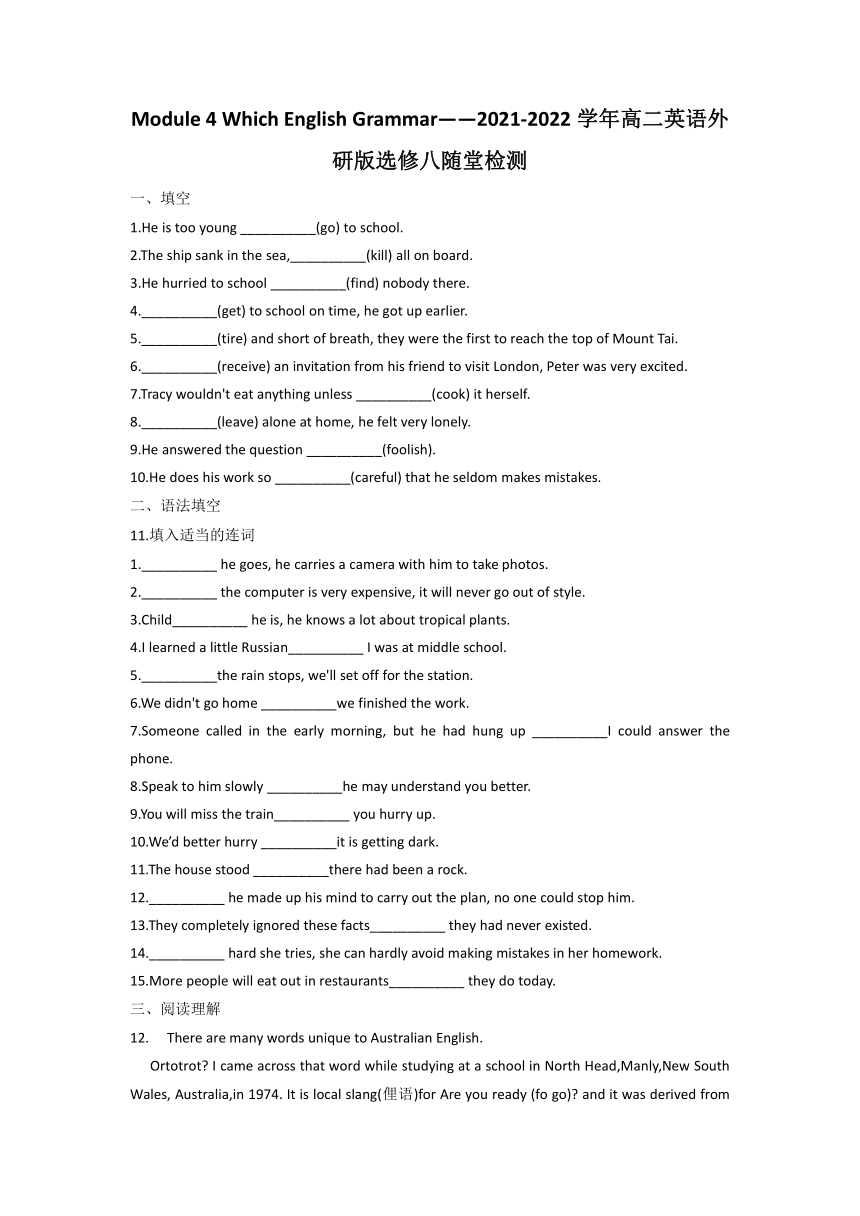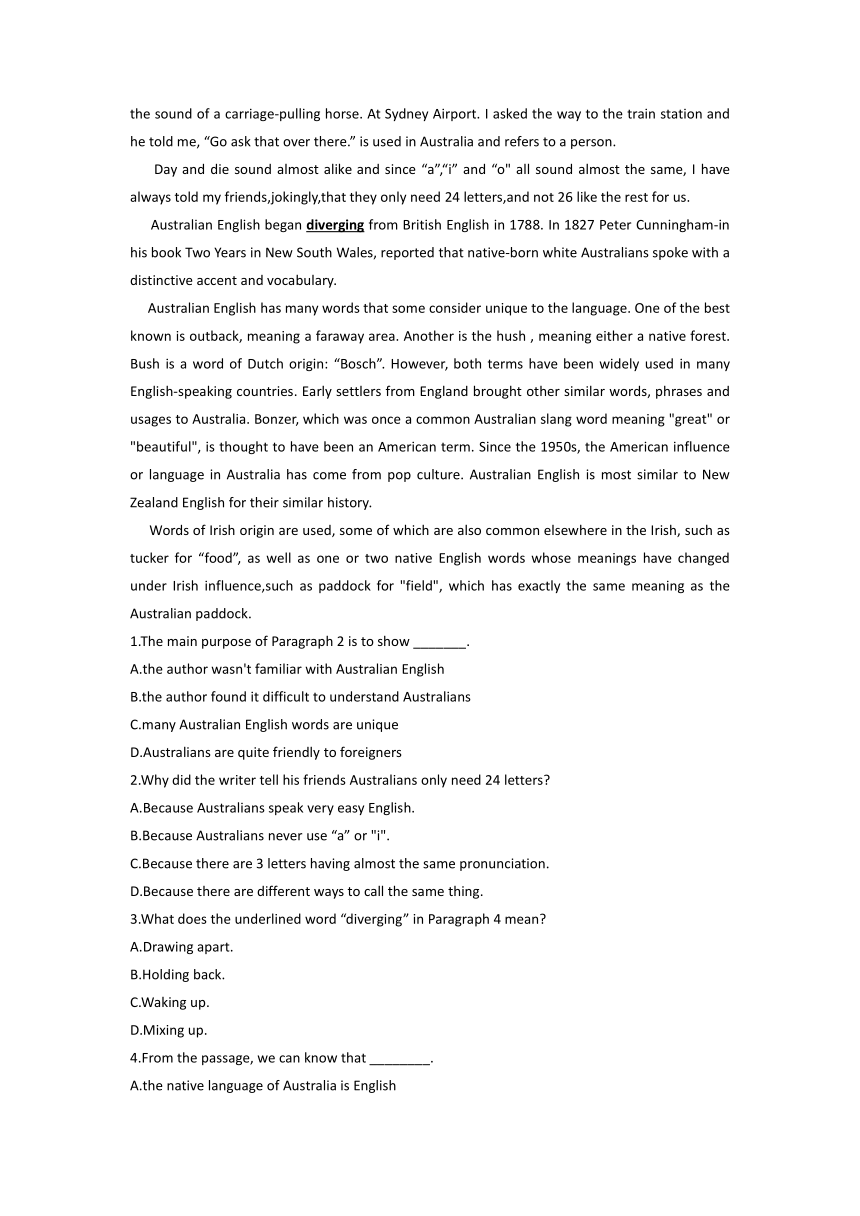外研版选修八: Module 4 Which English Grammar随堂检测(含答案)
文档属性
| 名称 | 外研版选修八: Module 4 Which English Grammar随堂检测(含答案) |

|
|
| 格式 | docx | ||
| 文件大小 | 18.6KB | ||
| 资源类型 | 教案 | ||
| 版本资源 | 外研版 | ||
| 科目 | 英语 | ||
| 更新时间 | 2022-02-24 00:00:00 | ||
图片预览


文档简介
Module 4 Which English Grammar——2021-2022学年高二英语外研版选修八随堂检测
一、填空
1.He is too young __________(go) to school.
2.The ship sank in the sea,__________(kill) all on board.
3.He hurried to school __________(find) nobody there.
4.__________(get) to school on time, he got up earlier.
5.__________(tire) and short of breath, they were the first to reach the top of Mount Tai.
6.__________(receive) an invitation from his friend to visit London, Peter was very excited.
7.Tracy wouldn't eat anything unless __________(cook) it herself.
8.__________(leave) alone at home, he felt very lonely.
9.He answered the question __________(foolish).
10.He does his work so __________(careful) that he seldom makes mistakes.
二、语法填空
11.填入适当的连词
1.__________ he goes, he carries a camera with him to take photos.
2.__________ the computer is very expensive, it will never go out of style.
3.Child__________ he is, he knows a lot about tropical plants.
4.I learned a little Russian__________ I was at middle school.
5.__________the rain stops, we'll set off for the station.
6.We didn't go home __________we finished the work.
7.Someone called in the early morning, but he had hung up __________I could answer the phone.
8.Speak to him slowly __________he may understand you better.
9.You will miss the train__________ you hurry up.
10.We’d better hurry __________it is getting dark.
11.The house stood __________there had been a rock.
12.__________ he made up his mind to carry out the plan, no one could stop him.
13.They completely ignored these facts__________ they had never existed.
14.__________ hard she tries, she can hardly avoid making mistakes in her homework.
15.More people will eat out in restaurants__________ they do today.
三、阅读理解
12. There are many words unique to Australian English.
Ortotrot I came across that word while studying at a school in North Head,Manly,New South Wales, Australia,in 1974. It is local slang(俚语)for Are you ready (fo go) and it was derived from the sound of a carriage-pulling horse. At Sydney Airport. I asked the way to the train station and he told me, “Go ask that over there.” is used in Australia and refers to a person.
Day and die sound almost alike and since “a”,“i” and “o" all sound almost the same, I have always told my friends,jokingly,that they only need 24 letters,and not 26 like the rest for us.
Australian English began diverging from British English in 1788. In 1827 Peter Cunningham-in his book Two Years in New South Wales, reported that native-born white Australians spoke with a distinctive accent and vocabulary.
Australian English has many words that some consider unique to the language. One of the best known is outback, meaning a faraway area. Another is the hush , meaning either a native forest. Bush is a word of Dutch origin: “Bosch”. However, both terms have been widely used in many English-speaking countries. Early settlers from England brought other similar words, phrases and usages to Australia. Bonzer, which was once a common Australian slang word meaning "great" or "beautiful", is thought to have been an American term. Since the 1950s, the American influence or language in Australia has come from pop culture. Australian English is most similar to New Zealand English for their similar history.
Words of Irish origin are used, some of which are also common elsewhere in the Irish, such as tucker for “food”, as well as one or two native English words whose meanings have changed under Irish influence,such as paddock for "field", which has exactly the same meaning as the Australian paddock.
1.The main purpose of Paragraph 2 is to show _______.
A.the author wasn't familiar with Australian English
B.the author found it difficult to understand Australians
C.many Australian English words are unique
D.Australians are quite friendly to foreigners
2.Why did the writer tell his friends Australians only need 24 letters
A.Because Australians speak very easy English.
B.Because Australians never use “a” or "i".
C.Because there are 3 letters having almost the same pronunciation.
D.Because there are different ways to call the same thing.
3.What does the underlined word “diverging” in Paragraph 4 mean
A.Drawing apart.
B.Holding back.
C.Waking up.
D.Mixing up.
4.From the passage, we can know that ________.
A.the native language of Australia is English
B.the first settlers came to Australia in 1827
C.American pop culture plays a part in Australian English
D.Peter Cunningham went to visit Australia in the 1850s
答案以及解析
1.答案:to go
2.答案:killing
3.答案:to find
4.答案:To get
5.答案:Tired
6.答案:Receiving
7.答案:cooking
8.答案:Left
9.答案:foolishly
10.答案:carefully
11.答案:1.Wherever; 2.Although/Though; 3.as/though; 4.when/while; 5. As soon as/If; 6.until; 7.before; 8.so that/in order that
9.unless; 10.as; 11.where; 12.Once; 13.as if; 14.However; 15.as
12.答案:1.C; 2.C; 3.A; 4.C
解析:1.推理判断题。作者在本段举的两个例子都是为了说明澳大利亚英语有其独有的词汇。
2.细节理解题。根据第三段前半句可知,作者之所以认为澳大利亚人只需要24个字母,是因为在澳大利亚英语中“a”,“i”和“o”这三个字母的发音很相似。
3.词义猜测题。根据下文所述,澳大利亚英语有了自己本土的、 独特的口音和词汇。由此可以推知,此处指澳大利亚英语从英国英语中分离了出来,故A项“分离”符合题意。
4.细节理解题。根据文章第五段倒数第二句可知,美国的流行文化影响了澳大利亚英语。
一、填空
1.He is too young __________(go) to school.
2.The ship sank in the sea,__________(kill) all on board.
3.He hurried to school __________(find) nobody there.
4.__________(get) to school on time, he got up earlier.
5.__________(tire) and short of breath, they were the first to reach the top of Mount Tai.
6.__________(receive) an invitation from his friend to visit London, Peter was very excited.
7.Tracy wouldn't eat anything unless __________(cook) it herself.
8.__________(leave) alone at home, he felt very lonely.
9.He answered the question __________(foolish).
10.He does his work so __________(careful) that he seldom makes mistakes.
二、语法填空
11.填入适当的连词
1.__________ he goes, he carries a camera with him to take photos.
2.__________ the computer is very expensive, it will never go out of style.
3.Child__________ he is, he knows a lot about tropical plants.
4.I learned a little Russian__________ I was at middle school.
5.__________the rain stops, we'll set off for the station.
6.We didn't go home __________we finished the work.
7.Someone called in the early morning, but he had hung up __________I could answer the phone.
8.Speak to him slowly __________he may understand you better.
9.You will miss the train__________ you hurry up.
10.We’d better hurry __________it is getting dark.
11.The house stood __________there had been a rock.
12.__________ he made up his mind to carry out the plan, no one could stop him.
13.They completely ignored these facts__________ they had never existed.
14.__________ hard she tries, she can hardly avoid making mistakes in her homework.
15.More people will eat out in restaurants__________ they do today.
三、阅读理解
12. There are many words unique to Australian English.
Ortotrot I came across that word while studying at a school in North Head,Manly,New South Wales, Australia,in 1974. It is local slang(俚语)for Are you ready (fo go) and it was derived from the sound of a carriage-pulling horse. At Sydney Airport. I asked the way to the train station and he told me, “Go ask that over there.” is used in Australia and refers to a person.
Day and die sound almost alike and since “a”,“i” and “o" all sound almost the same, I have always told my friends,jokingly,that they only need 24 letters,and not 26 like the rest for us.
Australian English began diverging from British English in 1788. In 1827 Peter Cunningham-in his book Two Years in New South Wales, reported that native-born white Australians spoke with a distinctive accent and vocabulary.
Australian English has many words that some consider unique to the language. One of the best known is outback, meaning a faraway area. Another is the hush , meaning either a native forest. Bush is a word of Dutch origin: “Bosch”. However, both terms have been widely used in many English-speaking countries. Early settlers from England brought other similar words, phrases and usages to Australia. Bonzer, which was once a common Australian slang word meaning "great" or "beautiful", is thought to have been an American term. Since the 1950s, the American influence or language in Australia has come from pop culture. Australian English is most similar to New Zealand English for their similar history.
Words of Irish origin are used, some of which are also common elsewhere in the Irish, such as tucker for “food”, as well as one or two native English words whose meanings have changed under Irish influence,such as paddock for "field", which has exactly the same meaning as the Australian paddock.
1.The main purpose of Paragraph 2 is to show _______.
A.the author wasn't familiar with Australian English
B.the author found it difficult to understand Australians
C.many Australian English words are unique
D.Australians are quite friendly to foreigners
2.Why did the writer tell his friends Australians only need 24 letters
A.Because Australians speak very easy English.
B.Because Australians never use “a” or "i".
C.Because there are 3 letters having almost the same pronunciation.
D.Because there are different ways to call the same thing.
3.What does the underlined word “diverging” in Paragraph 4 mean
A.Drawing apart.
B.Holding back.
C.Waking up.
D.Mixing up.
4.From the passage, we can know that ________.
A.the native language of Australia is English
B.the first settlers came to Australia in 1827
C.American pop culture plays a part in Australian English
D.Peter Cunningham went to visit Australia in the 1850s
答案以及解析
1.答案:to go
2.答案:killing
3.答案:to find
4.答案:To get
5.答案:Tired
6.答案:Receiving
7.答案:cooking
8.答案:Left
9.答案:foolishly
10.答案:carefully
11.答案:1.Wherever; 2.Although/Though; 3.as/though; 4.when/while; 5. As soon as/If; 6.until; 7.before; 8.so that/in order that
9.unless; 10.as; 11.where; 12.Once; 13.as if; 14.However; 15.as
12.答案:1.C; 2.C; 3.A; 4.C
解析:1.推理判断题。作者在本段举的两个例子都是为了说明澳大利亚英语有其独有的词汇。
2.细节理解题。根据第三段前半句可知,作者之所以认为澳大利亚人只需要24个字母,是因为在澳大利亚英语中“a”,“i”和“o”这三个字母的发音很相似。
3.词义猜测题。根据下文所述,澳大利亚英语有了自己本土的、 独特的口音和词汇。由此可以推知,此处指澳大利亚英语从英国英语中分离了出来,故A项“分离”符合题意。
4.细节理解题。根据文章第五段倒数第二句可知,美国的流行文化影响了澳大利亚英语。
